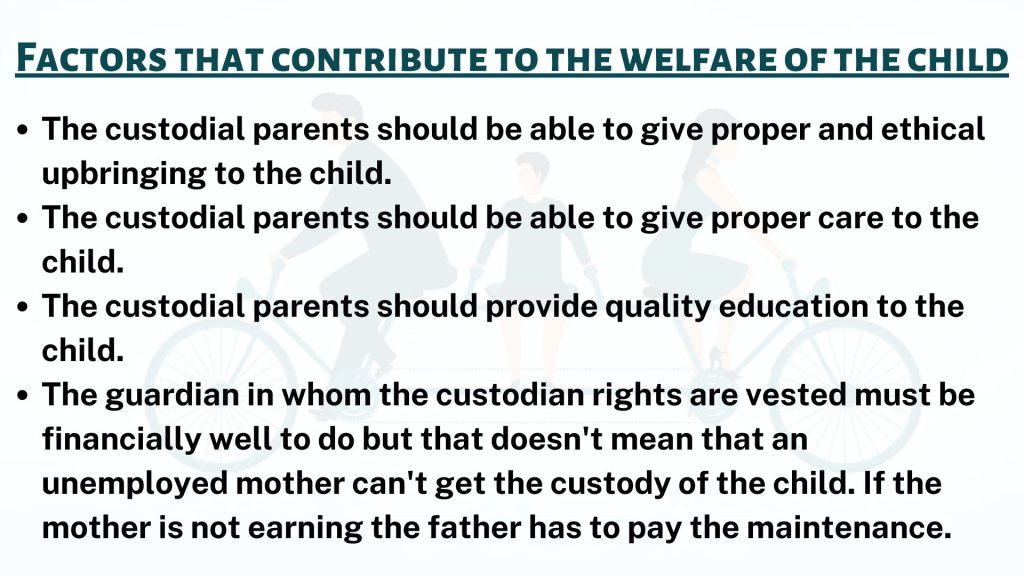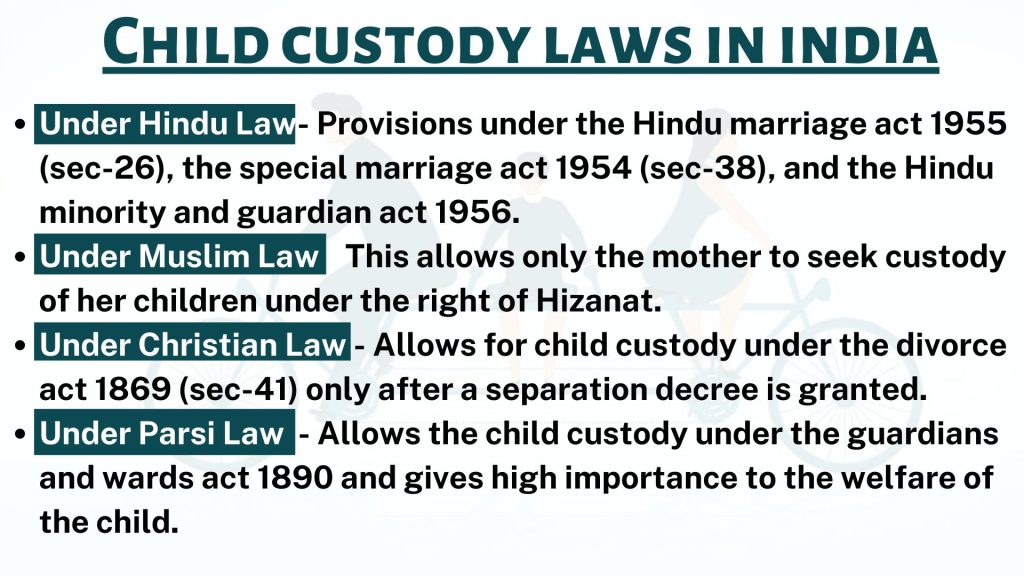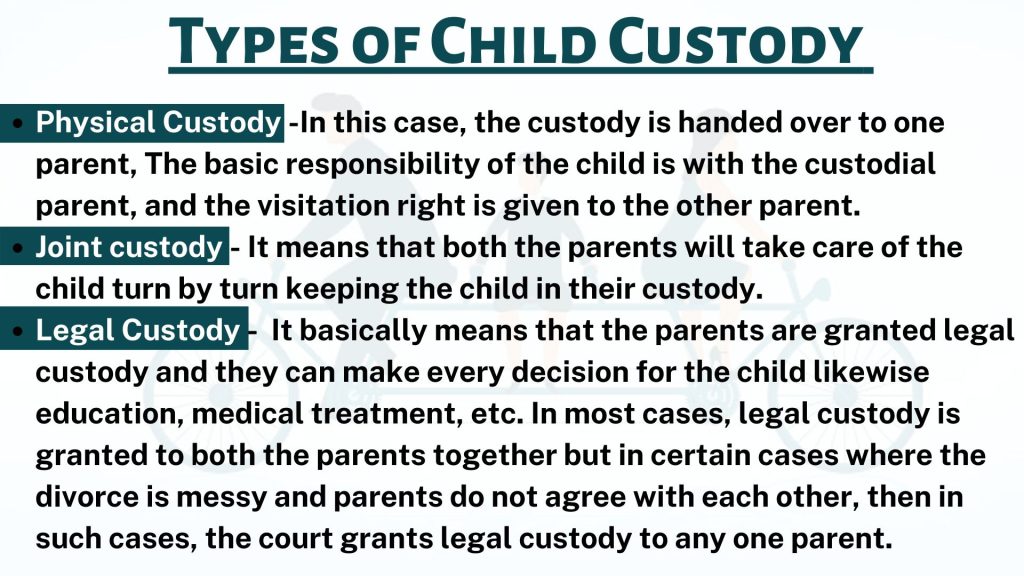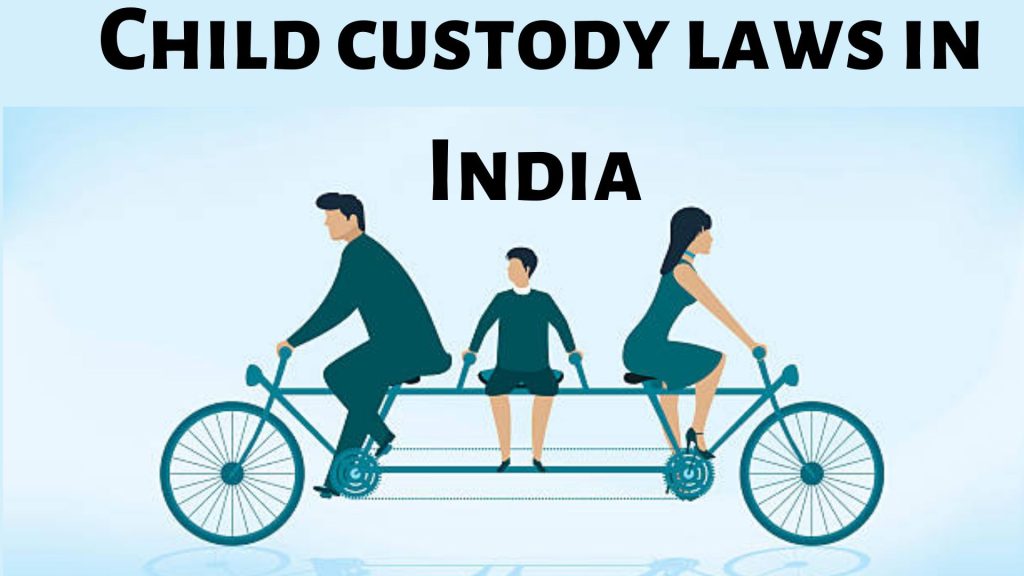Introduction
The issue of child custody crops up during divorce proceedings or judicial separation of the parents. We have various child custody laws in India that govern the process of child custody.
Well, I think this is the most crucial and tough part of the separation of couples who have kids. The matter should be carefully decided by the courts in order to protect the child’s best interest.
In this article, we will cover child custody laws in India and the best child custody lawyers in Delhi.
Who has the right over the minor child after the divorce?
Well both the parents have equal rights over the child but in most cases, the mother has an upper hand.
However, it is to be noted that while the custody is granted to only one parent, the access to the child is granted to both.
In several judgments, while assigning custody, the court has given importance to the ‘best interest of the child’ and not the ‘right of the parent’.
If the child is above 18 years of age, he/she has the full right to choose which parent to live with.
Suggested Reading: Reasons for Divorce in India
Factors that contribute to the welfare of the child.

As said above the court gives priority to the child’s best interest and not the interests of the parents.
The family courts when handing over the custodial rights to one of the parents, the decision is based on the attempt to assure the best possible future of the child in question. The question of welfare is decided on four distinct parameters, they are:
- The custodial parents should be able to give proper and ethical upbringing to the child.
- The custodial parents should be able to give proper care to the child.
- The custodial parents should provide quality education to the child.
- The guardian in whom the custodian rights are vested must be financially well to do but that doesn’t mean that an unemployed mother can’t get the custody of the child. If the mother is not earning the father has to pay the maintenance.
Suggested Reading: Aspects you must take care of before filing for divorce in India
Child custody laws in India

Let’s understand this with the help of the table
| Hindu | Muslim | Christian | Parsi | |
| Governing Laws | Governed by the Hindu Minority and Guardianship Act, read with the (secular) Guardians and Wards Act, 1890. | Governed by personal law read with the Guardians and Wards Act, 1890. | Governed by the Guardians and Wards Act, 1890 read with the Indian Divorce Act, 1869. | Governed by the Guardians and Wards Act, 1890. |
| The distinction between the rights of father and mother | Father is treated as the natural guardian. | Father is treated as the natural guardian. | No such distinction. | No such distinction. |
| In the best interest of the child | The best interest of the child is considered. | The best interest of the child is considered. | The fundamental principle for granting custody is the best interest of the child. | The fundamental principle for granting custody is the best interest of the child. |
| Child’s consent | The child has a say in the granting of custody. | The child’s opinion is considered. | The child’s opinion is given considerable value if he is able to understand the situation. | The child’s opinion is given considerable value if he is able to understand the situation. |
Custody under Hindu Law:
The Hindu Laws are applicable only if both the parents are Hindus. The reforms and regulations set for gaining custodial rights under the Hindu laws are prescribed in three different acts:
- Section 26 of the Hindu Marriage Act, 1955 bestows the authority of passing interim orders, judgments, amendments, etc. concerning the child’s maintenance and can dispose of the pending decree within 60 days from the date of service of notice of the court.
- This Act deals with the maintenance, education, and care of a child and validates the child’s custody if and only if both the parents follow the Hindu religion. Under this Act, the court can at any point of time pass interim orders, judgments, amendments, etc. for the child’s maintenance and can dispose of the pending decree within 60 days from the date of service of notice.
- Hindu Minority and Guardianship Act, 1956 declares that only biological Hindu parents have the right to seek the custody of their minor child, step-parents are not given the right to seek the custody of their minor child only if he/she is a Hindu.
- Section 38 of Special Marriage Act 1954: The Act validates the child’s custody if both the parents belong to different religions or have undertaken a court marriage. Under this Act, the court can at any point of time pass interim orders, judgments, amendments, etc. for the child’s maintenance and can dispose of the pending decree within 60 days from the date of service of notice
Custody under Muslim Law:
According to Muslim law, only the mother has sole custody of the children under the Right of Hizanat unless she is proven guilty of misconduct. The father is given the Right of Hizanat only in the absence of an able mother.
Certain general principles adopted for custody of a Muslim child are –
- Under Shia law, a mother’s right to the custody of her minor children extends until a son is two years old, and the daughter attains the age of seven.
- Under Hanafi law, custody of a child is with the mother till he attains the age of 7 in the case of a boy; and till she attains puberty in the case of a girl.
- The mother’s right of custody continues even if she is divorced but in the case of remarriage, the custody belongs to the father.
- The consent of the child is taken into consideration if he is held to be able to understand his interests. Further, such consent has to be cross-checked to identify there’s no element of tutoring present. In case there is, the consent of a child has to be disregarded.
- The custody of a boy above the age of 7 and a girl who has attained puberty is transferred to the father who likes in the case of Hinduism is considered to be the natural guardian.
- The above rules are subject to certain exceptions wherein certain people are denied custody irrespective of their gender. These rules are:
- A person who possesses a bad moral character;
- A person who has ceased to be a Muslim and thereby converted to any other religion;
- A person who does not have a sound mind;
- The doctrine of ‘best interest of the child’ applies here also and a person who cannot take proper care of the child is not entitled to the custody;
- A woman who has married within prohibited relationships.
Custody under Christian law:
- There are no prescribed laws for child custody in the Christian laws but the issues are sorted by Section 41 of the Indian Divorce Act, 1869.
- Reforms and laws were set under Section 41 of the Divorce Act 1869. In addition to this, Sections 42 and 43 of the same Act hold the right to decide upon the child’s custody once the judgment concerning separation or divorce has been passed.
- The couples, however, have an option of choosing to be protected under the Special Marriages Act. Section 38 of the Special Marriages Act, 1954 validates the child’s custody in cases where the parents belong to different religions or have taken a court marriage and explains the powers of the court over providing judicial custody.
Custody under Parsi law
The custody rights are managed by the Guardians and Wards Act, 1890. The Act primarily aims at the betterment of the child and has multiple legal provisions to ensure the same.
Types of child custody

There are basically 3 types of custody that are awarded to the parents. Let’s discuss them one by one
- Physical custody
In this case, the custody is handed over to one parent, The basic responsibility of the child is with the custodial parent, and the visitation right is given to the other parent. This is done to ensure that the child will get the love and affection of both the parents in his/her formative years.
- Joint custody
As the name suggests joint custody means that the parents will have to take care of the child jointly. It means that both the parents will take care of the child turn by turn keeping the child in their custody. The rotation of the child to each parent ensures that the child will get the love and affection of both the parents and similarly both the parents will ge6t equal chance to spend with their child. In this way, both the parent and the child will get each other’s time and attention.
- Legal custody
Legal custody of a child does not necessarily entail having the child with the parents or vice-versa. It basically means that the parents are granted legal custody and they can make every decision for the child likewise education, medical treatment, etc. In most cases, legal custody is granted to both the parents together but in certain cases where the divorce is messy and parents do not agree with each other, then in such cases, the court grants legal custody to any one parent.
Suggested Reading: How to Avoid Paying Alimony in India?
Conclusion
The custody of the child is a very sensitive and convoluted topic.
It is highly recommended that you take the help of an experienced custody and divorce lawyer to get the outcome you want to have.
I hope this article would have been of some help to you. Do not forget to share it with someone who may need it.
